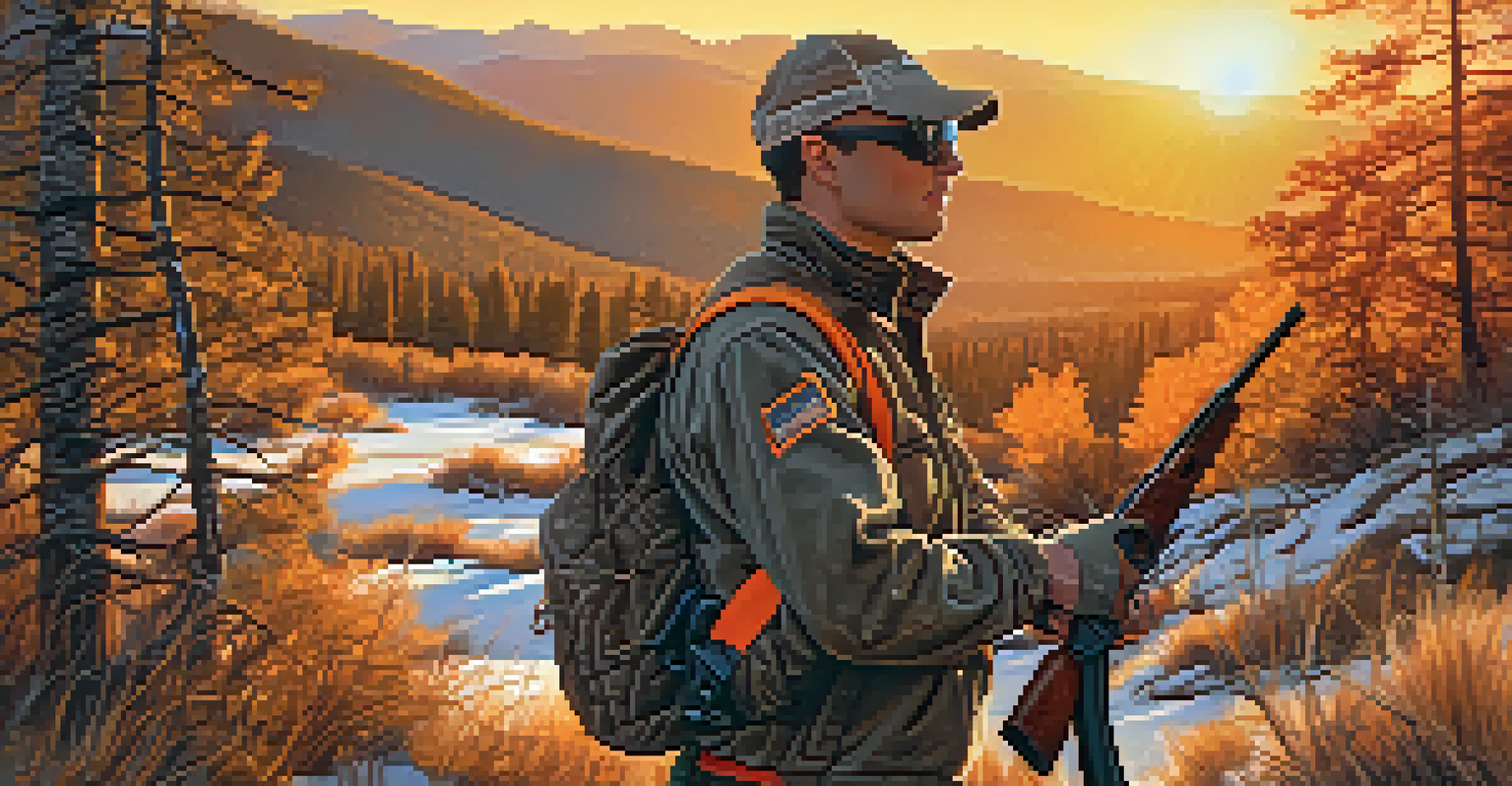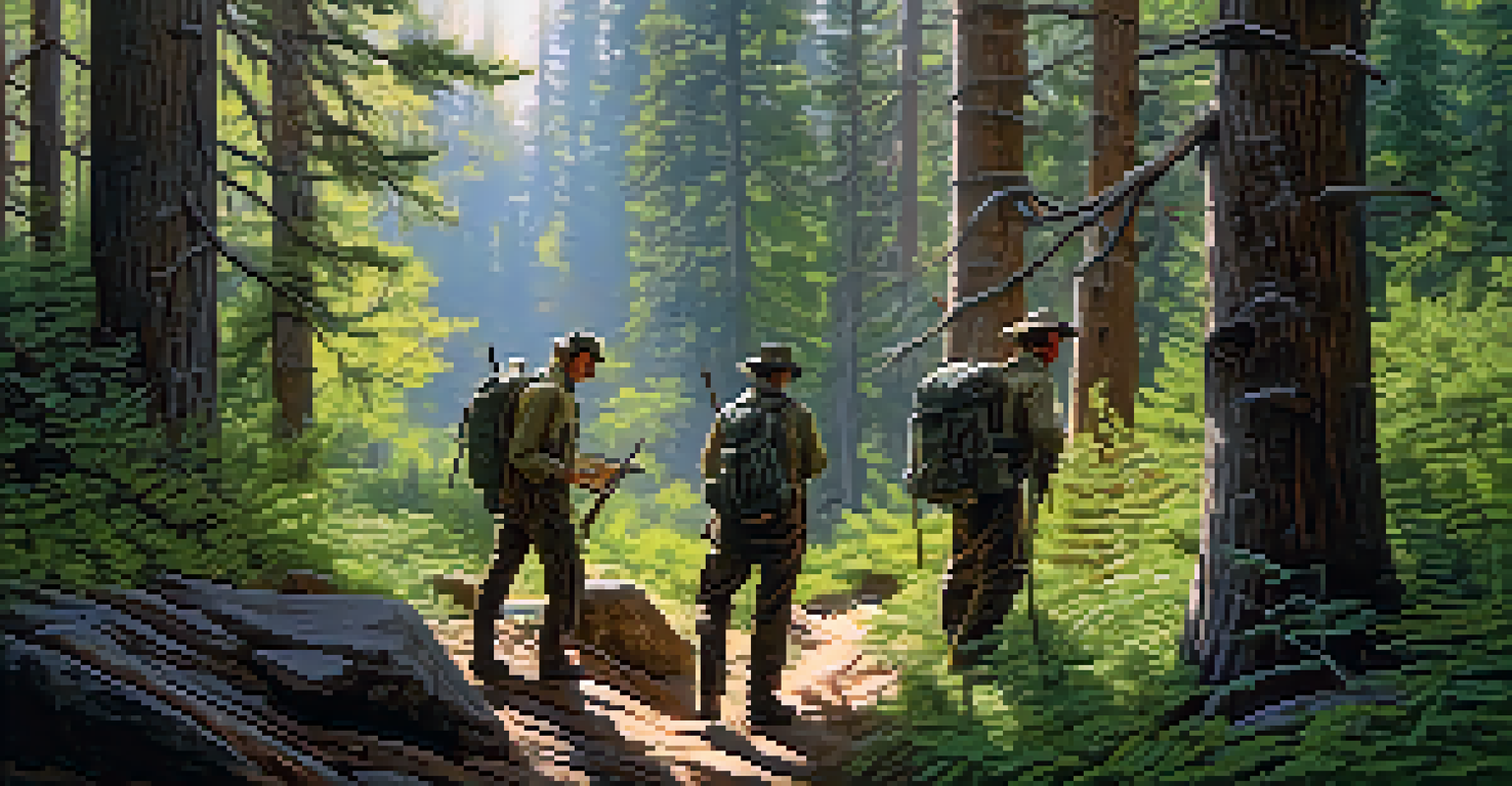Safety Regulations for Hunters in Colorado: What You Need

Understanding Colorado's Hunting Safety Regulations
Hunting in Colorado is not just about the thrill; it's also about ensuring safety for everyone involved. Familiarizing yourself with the state's hunting safety regulations is crucial for a successful outing. These rules are designed to protect hunters, non-hunters, and wildlife alike, so understanding them should be your top priority.
The safety of the hunter is paramount, and every precaution should be taken to ensure a safe and responsible hunt.
The Colorado Parks and Wildlife (CPW) provides a comprehensive guide to hunting regulations, which includes essential safety protocols. These regulations cover everything from the mandatory hunter education courses to the requirements for using firearms safely in the field. Knowing these can help prevent accidents and ensure you're following the law.
Moreover, adherence to these regulations fosters a culture of responsibility among hunters. It's about respecting not only the game but also fellow outdoor enthusiasts. By staying informed and compliant with safety regulations, you contribute to a safer hunting environment for everyone.
Mandatory Hunter Education Course Requirements
One of the first steps to hunting in Colorado is completing a hunter education course. This course is designed for first-time hunters and is mandatory for those born on or after January 1, 1949. It covers critical topics like firearm safety, wildlife conservation, and ethical hunting practices.

The course can be taken online or in a classroom setting, making it accessible for everyone. Upon completion, you’ll receive a hunter education card, which you must carry while hunting. This not only proves your knowledge but also shows your commitment to safe hunting practices.
Safety Regulations Are Essential
Understanding Colorado's hunting safety regulations is crucial for protecting hunters, wildlife, and the environment.
Completing this course can significantly reduce the likelihood of accidents in the field. It's a rite of passage that every responsible hunter should take seriously, ensuring that you are prepared to face the challenges of the great outdoors safely.
Firearm Safety and Handling Guidelines
When it comes to hunting, safety with firearms cannot be overstated. Colorado’s regulations require that all hunters handle firearms with extreme care. Always treat every firearm as if it’s loaded, and never point it at anything you do not intend to shoot.
Hunting is not just a sport; it's a responsibility that requires knowledge, respect, and careful consideration.
Additionally, wearing blaze orange clothing is highly recommended to increase visibility to other hunters. This simple measure can be a lifesaver, as it helps prevent accidental shootings. Remember, being seen is just as important as being aware of your surroundings.
Furthermore, familiarize yourself with your firearm and its operation before heading into the field. Regular practice at a shooting range can help ensure that you are comfortable and confident in your firearm handling skills, further reducing the risk of accidents.
Understanding Wildlife and Environmental Laws
Hunters in Colorado must also understand and abide by wildlife and environmental laws. These laws are in place to protect both the ecosystem and the game species. Knowing the regulations regarding hunting seasons, bag limits, and protected species is essential.
For instance, hunting a species out of season can lead to severe penalties, including fines and loss of hunting privileges. It's vital to check the current hunting regulations each year, as they can change based on population dynamics and environmental factors.
Complete Hunter Education Course
All first-time hunters must complete a mandatory education course to learn about firearm safety and ethical hunting practices.
Respecting wildlife laws not only helps maintain healthy animal populations but also contributes to the overall health of the ecosystem. When hunters comply with these laws, they play a significant role in conservation efforts, ensuring that future generations can enjoy the sport.
Proper Gear and Equipment for Safe Hunting
Having the right gear is crucial for a safe and enjoyable hunting experience. Colorado's terrain can vary widely, so it's important to dress appropriately for the weather and environment. Layering is key, as it allows you to adjust to changing temperatures throughout the day.
In addition to clothing, essential gear includes a well-maintained firearm, a first aid kit, and navigation tools like maps or GPS devices. Having these items on hand can make a significant difference in case of emergencies, ensuring that you’re prepared for anything that comes your way.
Moreover, it's wise to inform someone of your hunting plans, including where you'll be and when you expect to return. This simple step can provide an extra layer of safety, as it ensures that someone is aware of your location in case of an emergency.
Hunting with a Partner: A Safety Essential
One of the best safety practices in hunting is to never go alone. Hunting with a partner not only enhances the experience but also adds a crucial layer of safety. If something goes wrong, having someone there can make all the difference in an emergency situation.
When hunting with a partner, establish clear communication and set boundaries ahead of time. Discuss your hunting goals, areas you plan to cover, and how you will signal each other if you get separated. This proactive approach can help avoid misunderstandings and keep both hunters safe.
Emergency Preparedness is Key
Being prepared for emergencies while hunting can significantly reduce risks and enhance overall safety in the field.
Additionally, having a partner allows for shared responsibilities, such as tracking game and monitoring each other's safety. It fosters teamwork and camaraderie, making your hunting adventure more enjoyable while keeping safety at the forefront.
Emergency Preparedness While Hunting
Being prepared for emergencies is a critical aspect of safe hunting. Whether it’s a personal injury, getting lost, or an unforeseen weather change, having a plan can greatly mitigate risks. Carry a first aid kit and know how to use its contents, as well as how to communicate in case of emergencies.
Additionally, always ensure that your mobile phone is charged and that you have a way to signal for help if needed. Some areas may have limited service, so consider carrying a whistle or mirror for signaling. Knowing how to use these tools can be invaluable in a crisis.

Finally, familiarize yourself with the area you’ll be hunting in. Understanding the terrain and potential hazards can help you navigate safely and make better decisions if something goes awry. Preparedness is key to ensuring a safe and enjoyable hunting experience.